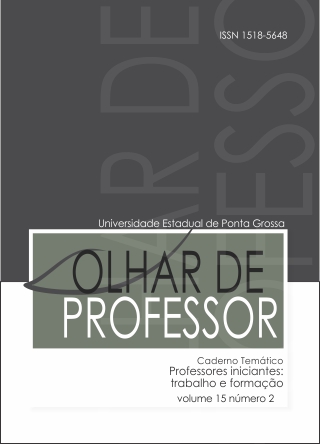Dilemas de professores tutores iniciantes na educação a distância
Conteúdo do artigo principal
Resumo
Socializamos nesta produção algumas reflexões sobre os dilemas de professores tutores iniciantes na educação a distância, a EaD, que tem produzido modificações nas relações sociais e na forma de ensinar e de aprender na contemporaneidade. Diante destas mudanças, autores como Tardif (1997; 2002; 2008), Nóvoa (2009); Pimenta (1999); Schlemmer (2009; 2012), Moran (2011), Belloni (2008), entre outros contribuem na discussão desta nova modalidade de ensinar e de aprender. A investigação buscou respostas para a seguinte questão: quais os principais dilemas que se fazem presentes na EaD, nos dizeres de professores tutores iniciantes em cursos ofertados por uma faculdade privada do estado de Santa Catarina? O objetivo geral foi compreender os dilemas de professores tutores iniciantes na EaD. De abordagem qualitativa, realizamos entrevistas com nove professores tutores iniciantes. As categorias de análise foram definidas a posteriori, a partir das regularidades encontradas nas manifestações dos participantes. Os principais dilemas apresentados pelos professores iniciantes foram quanto à dificuldade de desenvolver um processo de mediação da aprendizagem dos alunos; a necessidade de conhecer o conteúdo de diversas disciplinas; a não autonomia nos processos de avaliação da aprendizagem dos alunos; a pouca maturidade de alguns alunos; a falta de formação continuada específica e a necessidade de constituir uma identidade profissional docente na EaD. Conclui-se que a pesquisa propiciou uma reavaliação dos dilemas presentes na EaD e identificou a necessidade de avanços no desenvolvimento profissional docente do professor tutor iniciante.
Downloads
Detalhes do artigo
Autores que publicam nesta revista concordam com os seguintes termos:
a) Os autores mantêm os direitos autorais e concedem à revista o direito de primeira publicação, com o trabalho simultaneamente licenciado sob a Creative Commons Attribution License Atribuição 4.0 Internacional (CC BY 4.0) que permite o compartilhamento do trabalho com reconhecimento da sua autoria e publicação inicial nesta revista.
b) Os autores são autorizados a assinarem contratos adicionais, separadamente, para distribuição não exclusiva da versão publicada nesta revista (por exemplo, em repositórios institucionais ou capítulos de livros), com reconhecimento da sua autoria e publicação inicial nesta revista).
c) Os autores são estimulados a publicar e distribuir a versão onlline do artigo (por exemplo, em repositórios institucionais ou em sua página pessoal), considerando que isso pode gerar alterações produtivas, bem como aumentar o impacto e as citações do artigo publicado.
d) Esta revista proporciona acesso público a todo o seu conteúdo, uma vez que isso permite uma maior visibilidade e alcance dos artigos e resenhas publicados. Para maiores informações sobre esta abordagem, visite Public Knowledge Project, projeto que desenvolveu este sistema para melhorar a qualidade acadêmica e pública da pesquisa, distribuindo o OJS assim como outros softwares de apoio ao sistema de publicação de acesso público a fontes acadêmicas.
e) Os nomes e endereços de e-mail neste site serão usados exclusivamente para os propósitos da revista, não estando disponíveis para outros fins.
______________

Este obra está licenciado com uma Licença Creative Commons Atribuição 4.0 Internacional.





